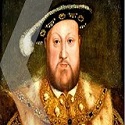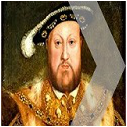Henry VIII,the Reign
Timeline 1532
Henry's Gift for Abbot of Abbingdon
The New Year’s gifts from Henry VIII in 1532 included £20, in a white leather purse with gold buttons, for the Abbot of Abingdon.
Third Session of Reformation Parliament
Annates Supplication Submission Parliament in session 15 January–14 May with a break at Easter.
Act in Conditional Restraint of Annates
March 1532
Payment of annates to the pope (first year’s revenue of a see from abbey to minor benefice. Latin annus/annual/year ) withheld, pending statutory abolition.
Payment of annates to the pope (first year’s revenue of a see from abbey to minor benefice. Latin annus/annual/year ) withheld, pending statutory abolition.
Supplication against the Ordinaries
18 March 1532
The Supplication against the Ordinaries was a petition passed by the House of Commons in 1532. It was the result of grievances against Church of England prelates and the clergy. Ordinaries in this Act means a cleric, such as the residential bishop of a diocese, with ordinary jurisdiction over a specified territory.
The Supplication against the Ordinaries was a petition passed by the House of Commons in 1532. It was the result of grievances against Church of England prelates and the clergy. Ordinaries in this Act means a cleric, such as the residential bishop of a diocese, with ordinary jurisdiction over a specified territory.
Gardiner’s Reply to Supplication Unwelcome
Stephen Gardiner was entrusted with the framing of a reply, which was adopted by convocation and in the hands of the king before the end of the month. In it, the ordinaries pointed out that the Supplication was full of sweeping general charges unsupported by a single specific instance.
The King is 'very angry' with Gardiner
13 May 1532
Extract from the dispatch from Imperial Ambassador Eustace Chapuys to Charles V.
Parliament is discussing the revocation of all synodal and other constitutions made by the English clergy, and the prohibition on holding synods without express licence from the king. This is a strange thing. Churchmen will be of less account than shoemakers, who have the power to assemble and make their own statutes. The king also wishes bishops not to have the power to lay hands on persons accused of heresy, saying that it is not their duty to meddle with bodies, and that they are only doctors of the soul. The Chancellor and the bishops oppose him. He is very angry, especially with the Chancellor (Sir Thomas More) and (Stephen Gardiner) the Bishop of Winchester, and is determined to carry the matter. London, 13 May 1532.
Extract from the dispatch from Imperial Ambassador Eustace Chapuys to Charles V.
Parliament is discussing the revocation of all synodal and other constitutions made by the English clergy, and the prohibition on holding synods without express licence from the king. This is a strange thing. Churchmen will be of less account than shoemakers, who have the power to assemble and make their own statutes. The king also wishes bishops not to have the power to lay hands on persons accused of heresy, saying that it is not their duty to meddle with bodies, and that they are only doctors of the soul. The Chancellor and the bishops oppose him. He is very angry, especially with the Chancellor (Sir Thomas More) and (Stephen Gardiner) the Bishop of Winchester, and is determined to carry the matter. London, 13 May 1532.
The Submission of the Clergy
15 May 1532
The Submission of the Clergy was a process by which the clergy submitted to the King’s Majesty (supreme authority) and gave up their assumed power to formulate church laws (cannons) without the king's permission. The submission took place at the so-called Rump Convocation despite Archbishop William Warham's protests. As a consequence, from 15 May 1532 there were no more church laws passed without the king’s permission.
The Submission of the Clergy was a process by which the clergy submitted to the King’s Majesty (supreme authority) and gave up their assumed power to formulate church laws (cannons) without the king's permission. The submission took place at the so-called Rump Convocation despite Archbishop William Warham's protests. As a consequence, from 15 May 1532 there were no more church laws passed without the king’s permission.
Thomas More Angry with the King and Resigns
16 May 1532
Thomas More resigned from his position as Lord Chancellor. ‘He had long wished to resign and his loathing of the Submission of the Clergy had evidently forced the issue.’
Thomas More resigned from his position as Lord Chancellor. ‘He had long wished to resign and his loathing of the Submission of the Clergy had evidently forced the issue.’
Archbishop Warham Dead
22 August 1532
Archbishop William Warham died aged eighty-two when visiting his nephew near Canterbury.
Archbishop William Warham died aged eighty-two when visiting his nephew near Canterbury.
Marchioness Anne Boleyn
1 September 1532
Anne Boleyn created Marchioness of Pembroke. Henry's father had been born Harri Tudur at Pembroke.
Castle in Wales.
Anne Boleyn created Marchioness of Pembroke. Henry's father had been born Harri Tudur at Pembroke.
Castle in Wales.
Cranmer Appointed Archbishop
1 October 1532
Thomas Cranmer, while in Austria, was appointed Archbishop of Canterbury. All the English bishops
were passed over for promotion.
Thomas Cranmer, while in Austria, was appointed Archbishop of Canterbury. All the English bishops
were passed over for promotion.
Thomas Cromwell to Eliminate Papacy from England
In early autumn, Thomas Cromwell began to draft legislation to eliminate the pope from any part of the secular or religious English legal system, which became known as the Act in
Restraint of Appeals.
Restraint of Appeals.
The King & Anne Boleyn Leave for France
10 October 1532
Frustrated by the lack of progress in persuading the pope to grant a divorce from Catherine of Aragon, Henry and Anne sailed to France to ask Francis to help them.
Frustrated by the lack of progress in persuading the pope to grant a divorce from Catherine of Aragon, Henry and Anne sailed to France to ask Francis to help them.


